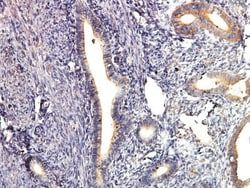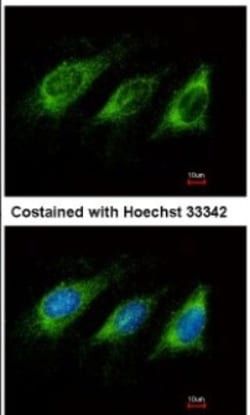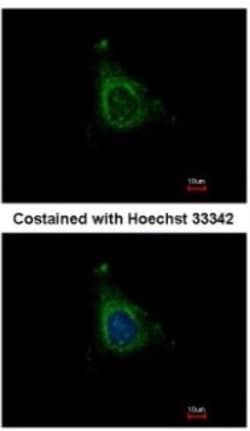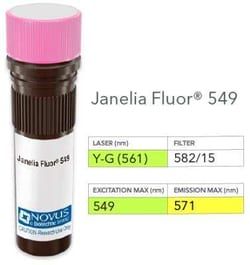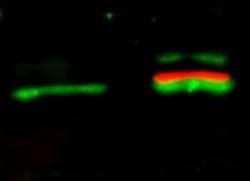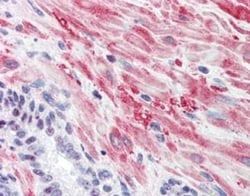AKT1 Antibody, Novus Biologicals™
Manufacturer: Novus Biologicals
Select a Size
| Pack Size | SKU | Availability | Price |
|---|---|---|---|
| Each of 1 | NB600608-Each-of-1 | In Stock | ₹ 36,668.00 |
NB600608 - Each of 1
In Stock
Quantity
1
Base Price: ₹ 36,668.00
GST (18%): ₹ 6,600.24
Total Price: ₹ 43,268.24
Antigen
AKT1
Classification
Polyclonal
Dilution
Western Blot 1:500-1:2000, Flow Cytometry 1:10-1:1000, ELISA 1:2000-1:10000, Immunohistochemistry 1:500-1:2000, Immunocytochemistry/Immunofluorescence 1:100-1:1000, Immunohistochemistry-Paraffin 1:10-1:500, N/A
Gene Accession No.
P31749, P31749, P31749, P31749
Gene Symbols
AKT1
Immunogen
AKT1 Antibody was produced from whole rabbit serum prepared by repeated immunizations with a synthetic peptide R-P-H-F-P-Q-F-S-Y-S-A-S-G-T-A corresponding to the C-terminus (460-480) of human AKT1 proteins conjugated to KLH using maleimide. A residue of cysteine was added to the amino terminal end to facilitate coupling. A BLAST analysis was used to suggest reactivity with this protein from rat, mouse, and chicken based on 100% homology for the immunogen sequence. (Uniprot: P31749)
Purification Method
Delipidation and Defibrination
Regulatory Status
RUO
Primary or Secondary
Primary
Test Specificity
Pan Anti-AKT1 Antibody reacts with the AKT1 from human tissues.
Content And Storage
Store at -20°C. Avoid freeze-thaw cycles.
Applications
Western Blot, Flow Cytometry, ELISA, Immunohistochemistry, Immunocytochemistry, Immunofluorescence, Immunohistochemistry (Paraffin)
Conjugate
Unconjugated
Formulation
0.02 M Potassium Phosphate, 0.15 M Sodium Chloride, pH 7.2 with 0.01% Sodium Azide
Gene Alias
AKT, AKT serine/threonine kinase 1, AKT1m, CWS6, EC 2.7.11, EC 2.7.11.1, PKB, PKB alpha, PKBMGC99656, PRKBA, Protein kinase B, Protein Kinase B Alpha, Proto-oncogene c-Akt, RAC, rac protein kinase alpha, RAC-ALPHA, RAC-alpha serine/threonine-protein kinas
Host Species
Rabbit
Molecular Weight of Antigen
55.7 kDa
Quantity
0.1 mL
Research Discipline
Cancer, mTOR Pathway
Gene ID (Entrez)
207
Target Species
Human, Mouse, Rat, Chicken
Form
Antisera
Description
- AKT1 Polyclonal specifically detects AKT1 in Human, Mouse, Rat, Chicken samples
- It is validated for Western Blot, Flow Cytometry, ELISA, Immunohistochemistry, Immunocytochemistry/Immunofluorescence, Immunohistochemistry-Paraffin.
